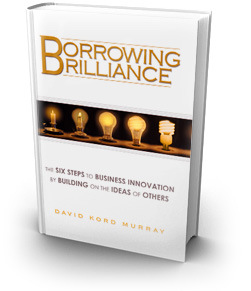I Renamed It: Shipwrecked by the laughter of the gods
 About a year ago I interviewed the pro-blogger and marketing guru David Meerman Scott. I asked him, why don’t my blog readers comment that often? He said I probably wasn’t saying incendiary or controversial things, which is fine depending on what I was trying to accomplish – and what I’m really trying to accomplish is to share the insights and ideas of those with leading ideas. My original post led with the line “Einstein: The secret to creativity is hiding your sources.” I received more notes and even a few comments on facebook to the effect that I had lost my mind. My favorite was author and innovation guru Stephen Lundin who wrote simply “Say what?!” I’m quite certain when Malcolm Gladwell said in his New Yorker review that Chris Anderson was wrong in his book Freeconomics, and then Seth Godin blogged that Malcolm was wrong they needed email filters to manage the deluge. Tim Sanders recently posted a nice piece of advice that our digital footprint may need constant pruning. Let me prune the original post…
About a year ago I interviewed the pro-blogger and marketing guru David Meerman Scott. I asked him, why don’t my blog readers comment that often? He said I probably wasn’t saying incendiary or controversial things, which is fine depending on what I was trying to accomplish – and what I’m really trying to accomplish is to share the insights and ideas of those with leading ideas. My original post led with the line “Einstein: The secret to creativity is hiding your sources.” I received more notes and even a few comments on facebook to the effect that I had lost my mind. My favorite was author and innovation guru Stephen Lundin who wrote simply “Say what?!” I’m quite certain when Malcolm Gladwell said in his New Yorker review that Chris Anderson was wrong in his book Freeconomics, and then Seth Godin blogged that Malcolm was wrong they needed email filters to manage the deluge. Tim Sanders recently posted a nice piece of advice that our digital footprint may need constant pruning. Let me prune the original post…
Aside from Einstein’s famous brilliance, he was also famous for his wit and his quote is pure tongue-in-cheek.
I appreciate David Murray’s book, Borrowing Brilliance, because it helps to heighten our awareness that most all great ideas are built on the shoulders of giants. We are all iterating on the great works of those before us and beware those who claim pure original thought. In addition to that witty remark, Einstein also said:
“Whoever undertakes to set himself up as a judge of Truth and Knowledge is shipwrecked by the laughter of the gods.” – Albert Einstein
One of my favorite TED talks is by writer Elizabeth Gilbert, author of Eat, Pray, Love, who suggests in this talk that the current culture favors identifying individuals as Geniuses, and yet the etymology of genius is from the Latin meaning a guardian spirit or deity who watches over each person from birth and can, at times, emerge to influence the person’s works of art or labor. Since the ‘genius’ was a disembodied spirit, the author had no total claim over the quality or originality of the finished work. Elizabeth likes this idea because it reinforces our mortality and fallibility, and to be elevated to the status of being a genius is an intolerable burden. Borrowing Brilliance is a wonderful work dedicated to understanding that the current ideas recognized as original thought are, in fact, built on the strength of those before who have, in turn, iterated on previous thought. So read the quote and post here as a celebration of the great history of innovation we are constantly building upon.
The secret to creativity is knowing how to hide your sources. – Albert Einstein
In 1971 Ray Tomlinson was working on ARPANET and mashed up terminal networks with an existing application that allowed users on the same terminal system to share messages. He wrote a script that allowed messages to distinguish between different machines and jump from one to another. Bill Gates got the idea for Windows from Apple’s graphical user interface (GUI). And Charles Darwin‘s Origin of the Species didn’t arrive fully formed from the cosmic muse, the ideas were germinating from the influence of his grandfather Erasmus Darwin, who wrote The Laws of Organic Life in 1796, in which he suggested sexual behavior and competition might affect species change.
For a fun read on the derivative nature of innovation, check out Borrowing Brilliance by David Murray.

